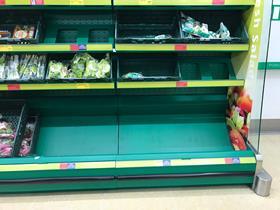
Retailers have warned of fresh food shortages and potential price rises in the event of a no-deal Brexit.
The British Retail Consortium, which represents supermarkets and other chains, told MPs they could not understand why Michael Gove had claimed this would not be the case in a BBC interview at the weekend.
Although fresh food entering the UK will not be subject to checks, hold-ups in France could cause problematic delays to imports of products such as lettuce, tomatoes and other fruit and vegetables.
“It will affect fresh food in various ways, availability, shelf life and potentially cost,” Andrew Opie, the consortium’s director of food and sustainability, told MPs on the Brexit select committee.
“Our assessment is based on discussion with our members, who move fresh food every day, and the likely disruption [at British and French ports].
“We modelled that with our members who have told us there will be disruption to fresh food.”
He added that the revised Brexit deadline of 31 October was “probably the worst time to face a no-deal Brexit” since warehouses will be full of Christmas stock, leaving little room for stockpiling.
“Logistics are already at full stretch, warehousing is at full premium,” he said, adding that the British Retail Consortium had warned the government of these risks back in January.
The availability of pallets could also be problematic since there would be a shortage of heat-treated wooden pallets which the EU requires to transport fresh food. Opie said the government wasn’t stockpiling pallets but that there were talks with manufacturers to make more.
In addition, concerns were raised about the prospect of eight-hour delays in Calais, with Karen Wheeler, former head of Brexit border delivery at HMRC, saying that even if 80 per cent of trucks made it through from Calais to Dover and Folkestone, there would be an issue.



